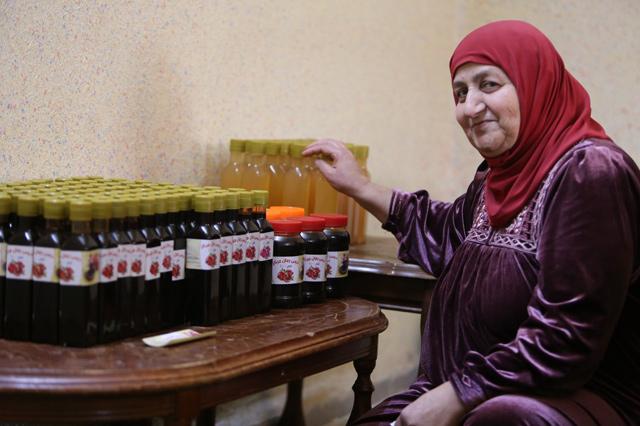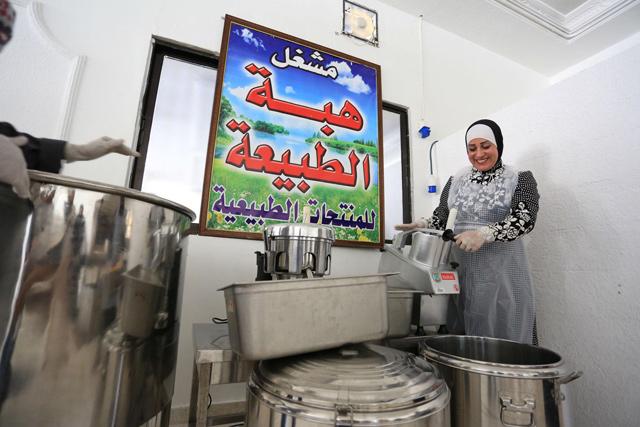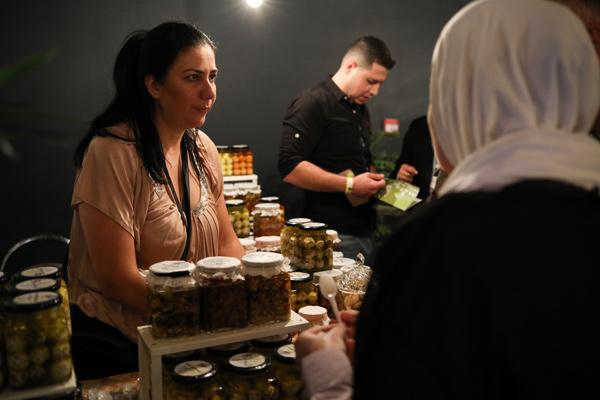You are here
Buying local food online: online platform connects producers to Amman customers
By Camille Dupire - Jun 18,2018 - Last updated at Jun 18,2018

The online platform Ayadi Albalad gives local producers an easier way to advertise their products to customers (Photo courtesy of USAID LENS)
AMMAN — Despite the great number of home based businesses (HBB) across the Kingdom, Jordan still lacks channels for local producers to reach out to customers living outside their local areas.
This prompted the USAID Local Enterprise Support Project (LENS) to provide support to a coalition of entrepreneurs led by Khordaji.com in setting up Ayadi Albalad, an online platform that helps HBB and small businesses in rural areas advertise their products and expand their customer base.
Filling a gap in the market
“There are over 12,000 home-run businesses in Jordan, most of which are run by women who specialise in artisanal food processing. For 75 per cent of them, the revenues generated from the sale of their products are the only source of income for them and their family,” noted Saad Abu Odeh, whose company Taoseal managed the USAID grant for the initiative.
Despite new regulations issued by the government to facilitate the start of HBB, transportation still constitutes a major hindrance for producers living in remote areas, according to market studies conducted by the USAID LENS, which noted “there is a growing demand for authentic, homemade food products among Jordanians, and a real need for a market-driven solution that connects local food producers in remote communities with customers and businesses that cannot access these products due to lack of transportation."
“One of the biggest challenges for these HBB face is their inability to widen their customer base and reach bigger markets to grow and expand. This is due to the limitations of suitable, affordable means of transport for their goods and collection from customers but also to their limited resources in marketing their products,” Abu Odeh told The Jordan Times.
In 2016, a number of companies, including Taoseal, received a grant from USAID LENS to launch Ayadi Albalad, aiming to fill this gap by providing HBB with an opportunity to reach the country's most populated cities.
“It took almost a full year of testing to come up with a system that works for everyone, and find the most effective transportation and logistics mechanisms for the pick-up and delivery of products,” recalled Abu Odeh, adding “we made connections with different associations in the three target governorates which act as hubs that communicate with the home business owners, allow them to take jars for their products, drop them off when they are ready, and receive their payments.”
Certified quality
Officially launched a year later, Ayadi Albalad is "the first of its kind" website in the Kingdom, giving customers a convenient way to purchase "authentic, fresh artisanal food products while supporting local HBBs at the same time”, according to the platform’s vision.
"Because they are not hampered by the need to manage delivery and payment complications, these HBBs can focus purely on producing sustainable high-quality foods and on meeting the market demand, leaving the rest to Ayadi Albalad," Abu Odeh said, stressing that him and his partners work to ensure that products are 100 per cent natural, additive- and preservative-free by providing containers, jars and all the packaging requirements to the businesses.
Products available on the platform include pickles, makdous, jams and honey, ghee, cheeses, jameed and labaneh, among many other foods.
Empowering
local producers
“Before working with Ayadi Albalad, I used to make my products without knowing if they were going to sell or not, and that was mainly due to the lack of marketing and the resources to do so," recounted Siham Mayaatah, one of the Ayadi Albalad beneficiaries, adding "everything changed now, I am focusing on the quality of my food because I know that my products will be marketed and sold through the platform."
"I am finally making additional income to cover at least part of the costs of my children’s university education, and my products are reaching big markets in areas I never thought I would be able to reach,” the producer rejoiced.
Since its launch in September 2017, Ayadi Albalad registered some 403 HBBs from Karak, Irbid and Zarqa on the platform, 200 of which have already started selling their products to new customers.
Challenges ahead
However, Abu Odeh noted that, because of the more "basic" nature of the HBBs, it is sometimes hard to get them to sign up to the platform.
"We worked on a three-tier pricing policy that would allow each HBB to pick one of the three prices that suited them best, while allowing price changes down the road," he explained, stressing "this solution worked very well."
The Ayadi Albalad team acknowledges they still suffer from a low demand due to Jordanians' lack of readiness to buy food online and to customers' hesitation in terms of hygiene.
"Many customers assume that products coming from HBBs will be made with low hygiene standards. We are working hard to devise ways to overcome this preconception, for instance by participating in different farmers' markets around Amman, where marketed items offer a firsthand testimony to the quality of the products," Abu Odeh commented.
“With more and more people using the web for everyday needs and purchases, it is great to see local businesses make use of it to benefit them and their communities,” the entrepreneur stated, noting that “Ayadi Albalad has managed to revive authentic, traditional Jordanian recipes that people living in Amman have craved for so long, while maintaining connections with local communities”.
Related Articles
AMMAN — Almost a year ago, the Ministry of Municipal Affairs opened the door for home-based entrepreneurs to legally run their busines
AMMAN — Local female producers from across the Kingdom rejoiced this week, after seeing most of their production run out at the Jordan Food
AMMAN — The first business hub of The Informal Livelihoods Advancement Activity (Iqlaa) launched on Sunday in the Balqa governorate with ass



















